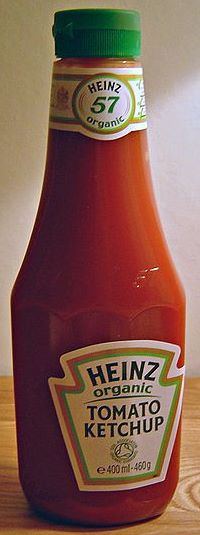Ketchup
Appearance

Ketchup is a table condiment, typically referring to tomato ketchup, which is a sweet, tangy, thick sauce made from tomatoes, sugar, vinegar, seasonings, and spices — sometimes with high fructose corn syrup, artificial flavorings, food colorings, and various food preservatives.
Quotes
[edit]- In contrast with simple liquids such as water, milk, honey, which easily flow as a continuous jet when poured from a vessel, pasty materials such as mayonnaise, mustard, ketchup, puree, etc., fall by fits and starts in a wide range of flow rates. This may, for example, be observed when ketchup or mayonnaise is pushed from a tube at a sufficient height over a plate: although surface tension effects are generally negligible because of its high viscosity the material drops as successive droplets of more or less similar size (except at large flow rates). Here we demonstrate that this effect is a kind of flow instability which develops when the weight of material becomes larger than a force due to its yield stress, namely a critical stress below which it cannot flow steadily.
- Philippe Coussot and F. Gaulard (2005). "Gravity flow instability of viscoplastic materials: The ketchup drip". Physical Review E 72 (3).
- With the establishment of tomato ketchup as the most popular and the cheapest English condiment after vinegar and mustard, came commercial competitors such as the enormously popular H.P., O.K., Flag, and many others, more or less successful, and often simply known as 'sauce'. It is mainly through the medium of these sauces, ketchups and relishes that as a nation we consume, indirectly, such immense quantities of spices, pepper and vinegar, although the massive displays of spices and dried herbs now to be seen in giant supermarkets, department stores and self-service provision shops do seem to point to a popular revival of interest in the direct uses of spices rather than through the medium of made-up sauces and ketchups.
- Elizabeth David, Spices, Salt and Aromatics in the English Kitchen. Penguin. 1970. p. 13. ISBN 978-0-14-046163-3. ebook reprint
- “The biggest tomato producer in the world today?” Smith paused, for dramatic effect. “China. You don’t think of tomato being a part of Chinese cuisine, and it wasn’t ten years ago. But it is now.” Smith dipped one of my French fries into the homemade sauce. “It has that raw taste,” he said, with a look of intense concentration. “It’s fresh ketchup. You can taste the tomato.” Ketchup was, to his mind, the most nearly perfect of all the tomato’s manifestations. It was inexpensive, which meant that it had a firm lock on the mass market, and it was a condiment, not an ingredient, which meant that it could be applied at the discretion of the food eater, not the food preparer.
- Malcolm Gladwell (quoting Andrew F. Smith) (September 6, 2004)"The ketchup conundrum". The New Yorker: 129–135. (quote from p. 133)
- Popular stereotypes to the contrary, ketchup was not an American creation. In the beginning ketchup was not thick, sweet, or tomato-based. Early recipes published in Great Britain in the eighteenth century fashioned ketchup from kidney beans, mushrooms, anchovies, and walnuts. British colonists in North America adopted and adapted these early recipes. On both sides of the Atlantic nontomato ketchup consumption expanded and reached its zenith during the latter part of the nineteenth century.
- Andrew F. Smith (1996). Pure Ketchup: A History of America's National Condiment, with Recipes. University of South Carolina Press. p. 4. ISBN 978-1-57003-139-7.


